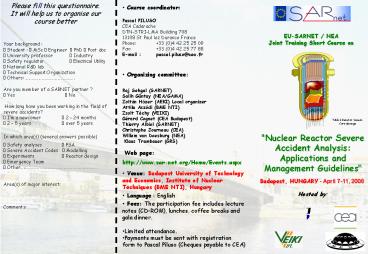Preliminary Announcement
1 / 2
Title:
Preliminary Announcement
Description:
'Nuclear Reactor Severe Accident Analysis: Applications and Management Guidelines' ... Zsolt T chy (VEIKI) G rard Cognet (CEA Budapest) Thierry Albiol (SARNET) ... – PowerPoint PPT presentation
Number of Views:18
Avg rating:3.0/5.0
Title: Preliminary Announcement
1
Please fill this questionnaire. It will help us
to organise our course better Your background
Student MSc Engineer PhD Post
doc University professor Industry
Safety regulator
Electrical Utility National RD lab
Technical Support Organization Others
. Are you member of a SARNET
partner ? Yes
No How long have you been working in the field
of severe accidents? Im a newcomer 2 24
months 2 5 years over 5 years In which
area(s) (several answers possible) Safety
analyses PSA Severe Accident
Codes Modelling Experiments Reactor
design Emergency Team
Other. Area(s) of major
interest Comments
- Course coordinator
- Pascal PILUSO
- CEA Cadarache
- DTN-STRI-LMA Building 708
- 13108 St Paul lez Durance France
- Phone 33 (0)4 42 25 25 09
- Fax 33 (0)4 42 25 77 88
- E-mail pascal.piluso_at_cea.fr
- Organizing committee
- Raj Sehgal (SARNET)
- Salih Güntay (NEA/GAMA)
- Zoltán Hózer (AEKI) Local organizer
- Attila Aszódi (BME NTI)
- Zsolt Téchy (VEIKI)
- Gérard Cognet (CEA Budapest)
EU-SARNET / NEA Joint Training Short Course on
TMI-2 Reactor Vessel-Core damage
"Nuclear Reactor Severe Accident Analysis
Applications and Management Guidelines"
Budapest, HUNGARY - April 7-11, 2008
Hosted by
2
- The severe accident research network SARNET - in
collaboration with the Nuclear Energy Agency
(NEA) (www.nea.fr) - is sponsoring a new one-week
Short Course entitled Nuclear Reactor Severe
Accident Analysis Applications and Management
Guidelines. This course is a part of the
Excellence Spreading activities of SARNET, which
are coordinated by KTH. The SARNET network is
co-funded by the EURATOM research program in the
6th Framework Programme of the European Union.
The Course will be organised by CEA and hosted by
VEIKI, AEKI and BME NTI, the local SARNET
organisations, in Budapest from April 7th to
11th, 2008. - This short course is a sequel to the Severe
Accident Courses that were sponsored by SARNET
and given in January 2006 and March 2007 at
Cadarache. The purpose of this course is to
describe the phenomenological models that have
been incorporated in the codes ASTEC, MELCOR and
MAAP, which are employed by the nuclear industry
to determine the consequences of postulated
severe accidents for the PWR, BWR and CANDU
plants. The course will describe applications of
the codes to estimate consequences for the
various severe accident scenarios and their use
to develop severe accident management (SAM)
guidelines that a utility company may follow. The
course content will include a discussion on the
uncertainties in the consequence estimates. It
will also include background lectures on water
cooled reactor safety, severe accident scenarios
and the events leading, respectively, to the
early and late failure of containment. Besides,
competence and experience acquired from NEA/CSNI
activities carried out during the last two
decades will be transferred to the participants.
The lectures will be given by experts from major
Nuclear Institutes and Universities working on
the topic (GRS, IRSN, JRC, KTH, FZK, CEA, PSI,
AECL, EDF, VTT, VEIKI, Sandia, FAI). A visit of
severe accident facilities (AEKI) and of the
training reactor (BME NTI) will be included.
Registration form Nuclear Reactor Severe Accident
Analysis-Applications and Management Guidelines
Budapest,Hungary-April 7-11, 2008
NAME (FIRST, LAST) AFFILIATION DEPARTMENT A
DDRESS PHONE (including country and area
codes) FAX E-MAIL The participation fee
includes lecture notes (CD-ROM), lunches, coffee
breaks and gala dinner. Please send
the registration fee cheque (payable to CEA)
together with registration form to Pascal
PILUSO-CEA
- This course will disseminate the knowledge gained
on the development and applications of the severe
accident codes during the last two decades to
engineers and researchers from industry,
utilities, regulatory bodies, Technical Support
Organizations, RD laboratories and Universities,
as well as students.
- It will be open for students (discount fee) and
can contribute 3 ECTS (with written work) as an
advanced course for Master and PhD students
(through the European Nuclear Education Network,
ENEN).
- A limited number of tuition grants for students
may be available for attendants from Central and
Eastern European Countries and Ukraine.
Application deadline Feb. 1, 2008.
- For more details, contact P. Piluso
(pascal.piluso_at_cea.fr) or visit our website on
http//www.sar-net.org/Home/Events.aspx































